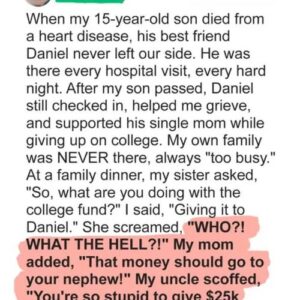I stared at the stack of bills on my tiny kitchen table. Each one was a reminder of the dream that felt just beyond my reach—a degree in medicine, a future of healing others. The financial burden was overwhelming, and I was desperately looking for any opportunity to earn more when my disabled neighbor, Mr. Wilson, offered to let me take care of him. And of course, I said yes.
At first, the arrangement seemed like a blessing. I started spending time with Mr. Wilson, taking care of him, making sure he had food, helping him with his daily needs, and just keeping him company. But I quickly realized that he was a grumpy old man. He always made me redo things and generally ignored me. Despite his harshness, I felt a deep loneliness in the sharp eyes of the elderly man. There was something about him that drew me in, a sense of unspoken sorrow that made me determined to break through his tough exterior.
One morning, as we were looking through old photo albums one after another, Mr. Wilson suddenly fell silent. I was about to open the last album when he took me by the hand and looked me straight in the eye. “Kid, sit down. I want to talk.”
“I know I’ve been hard on you,” he began, his voice softer than usual. “And I know you must think I’m just a bitter old man. But there’s more to it than that.”
I nodded, waiting for him to continue.
“You see, I had a family once. A wife, a son. We were happy, but I was always too busy with my career. I was a surgeon, one of the best. My work consumed me, and I neglected the people who mattered most. My wife left me, took our son with her. I was too proud to stop her, too proud to admit I was wrong.”
He paused, his eyes misty with memories. “I threw myself into my work even more after they left. But one day, I got a call. My son had been in a car accident. He needed surgery, but… I was too late. He died before I could get to him. My wife blamed me, and I blamed myself.”
I was speechless, not knowing what to say. Mr. Wilson’s story was heartbreaking, and it explained so much about his behavior.
“After that,” he continued, “I couldn’t bring myself to go back to the operating room. I retired early, withdrew from everything and everyone. That’s how I ended up here, alone and bitter.”
I squeezed his hand, feeling a surge of compassion. “I’m so sorry, Mr. Wilson. I can’t imagine how hard that must have been.”
He nodded, a tear rolling down his cheek. “I’ve pushed everyone away because I was afraid of getting hurt again. But you’ve been different. You’ve been patient with me, even when I didn’t deserve it. And for that, I want to thank you.”
I smiled, feeling a warmth spread through my chest. “I’m glad I could be here for you.”
Mr. Wilson took a deep breath. “There’s something else. I know you’re struggling with your bills, and I want to help. I have some money saved up, and I want to use it to pay for your education.”
I was stunned. “But Mr. Wilson, I can’t accept that. It’s too much.”
He shook his head. “It’s the least I can do. I want to make sure you achieve your dreams. Don’t make the same mistakes I did. Don’t let your dreams slip away.”
Tears filled my eyes as I realized the enormity of his gesture. “Thank you, Mr. Wilson. I don’t know what to say.”
“Just promise me one thing,” he said, his voice trembling. “Promise me you’ll never give up on your dreams, no matter how hard it gets.”
“I promise,” I said, my voice thick with emotion.
From that day on, our relationship changed. Mr. Wilson softened, and we grew closer. He became like a father to me, and I learned so much from his wisdom and experiences. And with his help, I was able to pursue my degree in medicine.
Mr. Wilson taught me that even the grumpiest of hearts can hold the deepest sorrows and the greatest generosity. He gave me more than financial support; he gave me hope, and for that, I would be forever grateful.





